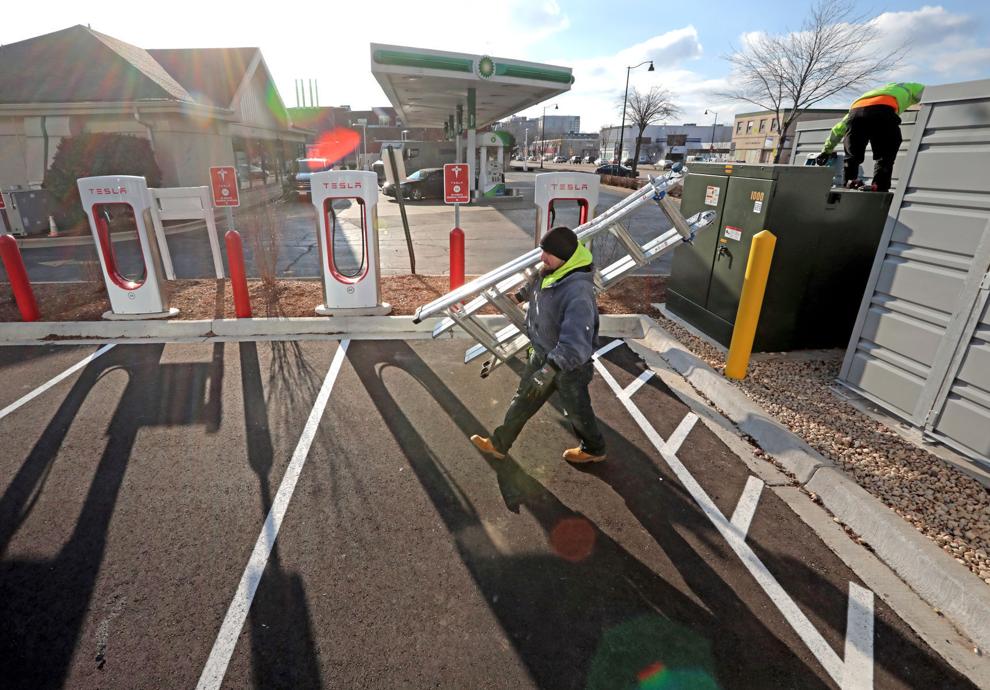MITCHELL SCHMIDT
Beginning after the first of the year, electric vehicle owners in Wisconsin will have to pay a new tax when filling up at a charging station.
The new 3-cent per-kilowatt-hour tax was approved in legislation passed earlier this year with the hopes of bolstering the state’s electric vehicle infrastructure and securing federal funds for additional charging stations along major highways and interstates.
The new tax represents “a crucial source of revenue for maintaining Wisconsin’s roadways and infrastructure,” David Casey, secretary of the state Department of Revenue, said in a statement. “It will help ensure continued funding for road repairs and construction as Wisconsin drivers increasingly make the switch to electric vehicles, while creating a more equitable system in which all drivers contribute to road maintenance costs,” Casey continued.
What is the new tax?
Previously, businesses that wanted to operate EV charging stations had to be regulated as a utility.
The new law exempts private businesses from the rule but requires that they sell electricity by the kilowatt-hour — that is, by the amount used — rather than by the length of time it takes to charge a vehicle.
 |
A new electric vehicle tax in Wisconsin is intended to help the state raise money to build more EV charging stations along state highways and interstates. |
Business owners must also pay a 3-cent per-kilowatt-hour excise tax on electricity sold through an EV charging station. That tax is applied to the total kilowatt-hours delivered regardless of whether the owner charges the consumer for the electricity.
Under the new law, any new charging stations built on or after March 22, 2024, as well as all current and future Level 3 chargers in the state, must charge for power by the kilowatt-hour and collect the excise tax. Residential chargers are exempt from the tax.
EV charging stations are characterized as Level 1, 2 or 3, with the third level being the fastest in terms of how long it takes to charge a vehicle.
Anyone who owns or operates an electric charging station must register with the state. Registration can be done online at the Department of Revenue’s online business tax registration website, tap.revenue.wi.gov/btr.
New revenue?
There were nearly 12,000 electric passenger vehicles and more than 15,000 electric trucks registered in the state as of September, according to the Wisconsin Department of Motor Vehicles. That doesn’t include electric cycles or autocycles.
The state Department of Revenue estimates the excise tax will generate about $3.35 million in revenue next year and about $3.85 million in revenue the following year. However, that number could be lower depending on how many EV drivers charge up at home. The state Department of Transportation previously estimated the tax to generate up to $314,000 in fiscal year 2025.
State officials say funds generated by the excise tax would go into Wisconsin’s transportation fund, which is used to fund infrastructure projects like roads and bridges.
How did we get here?
The new tax is tied to legislation passed by the Legislature and signed by Gov. Tony Evers in March.
The law was passed shortly before the deadline for Wisconsin to tap into more than $78 million in federal funds — first approved by the U.S. Department of Transportation in 2022 — aimed at boosting the number of EV charging stations along state highways and interstates.
The state can also apply for another $2.5 billion in competitive funding if it meets program requirements, including that stations charge by the kilowatt-hour.
The DOT plans to use that money to help develop dozens of new charging stations.





No comments:
Post a Comment